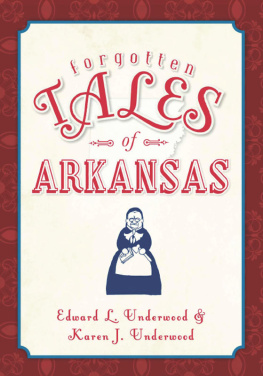Copyright 1991 by The Board of Trustees of the University of Arkansas
All rights reserved
Manufactured in the United States of America
21 20 19 18 17 5 4
First paperback printing 1993
This book was designed by Chiquita Babb using the Minion typeface.
The paper used in this publication meets the minimum requirements of the American National Standard for Permanence of Paper for Printed Library Materials Z39.48-1984.

Library of Congress Cataloging-in-Publication Data
Arnold, Morris S.
Colonial Arkansas, 1686-1804 : a social and cultural history / Morris S. Arnold.
p. cm.
Includes bibliographical references and index.
ISBN 1-55728-222-6 (alk. paper)
1. ArkansasHistory. 2. ArkansasSocial conditions. 3. Arkansas Post Region (Ark.)History. 4. Arkansas Post Region (Ark.)Social conditions. 5. FrenchArkansasHistory.
I. Title.
F411.A788 1991
976.702dc20
91-10223
CIP
ISBN-13: 978-1-61075-105-6 (electronic)
To the memory of my mother and father
The influence of the French effort, which was carried on so long, though only sporadically, and through so many disasters and failures, has long since mingled and become assimilated with the Anglo-Saxon culture of Arkansas. It has become, in its essence, much like those old disputed bones [of Pierre Lefevre]a thing of doubtful antiquity or paternity, a legend, a myth, a remote shadowy survival, although, as late as beyond the Civil War, cases based on French and Spanish land grantsusually to French familiesstill occurred in the Arkansas courts. Like the French celebration of Mardi Gras, still honored by masking on the streets during the days of my boyhoodand earlier celebrated by great parades and ballsthe French influence has, to all intents and purposes, disappeared. But the symbol of France, seen dimly in the great figures of La Salle and Tonti, of La Harpe, in the records of Arkansas Post, or in the mythical, unrealized Alsatian colony of John Law, serves to haunt us still, as a shadow crossing the familiar sunlight.
John Gould Fletcher, Arkansas
PREFACE
Though I did not know it then, the seeds for this book were laid more than a decade ago when I began work on another project, namely an effort to discover what Arkansas law was like before the Americans purchased Louisiana. An earlier book, Unequal Laws unto a Savage Race, resulted more immediately from that original enterprise. Though that book purported to be a legal history, there was a good deal of social history in it, for it was impossible to say anything realistic about colonial Arkansas law without first understanding the economy and social structure of the colonial period. It turned out that very little real work on these last items had previously been attemptedno one, for instance, had even done a proper job of divining where Arkansas Post had been located during the eighteenth century; and that was at first a major irritation, since it meant that I had to undertake work for which I was, in many senses, ill prepared. But that irritation quickly evolved into a curiosity that, in its turn, became a kind of infatuation: Here was a place, a whole state, whose colonial history had not been written! (In the psycho-babble of the twentieth century, I came to see an irksome problem as a very real opportunity.) After the previous book appeared, therefore, though by no means immediately thereafter, I resolved to stand it on its head by writing a social, economic, and political history of colonial Arkansas in which law would figure, it is true, but merely as one cultural artifact among others. Hence this book.
Because it has evidently never occurred to anyone else to write such a book as this, its title may evoke the wrong kind of smilecalling up, even from the friendliest minds, visions of sturdy hill folk turned out in tricornered hats. Colonial Arkansas is not a phrase one frequently hears: Indeed, I still recall the curious ring that it left in my ears when I first heard it from Margaret Ross a decade ago. But it is nevertheless the case that the Arkansas colonial period can reasonably be made to occupy a span of almost 120 years, from August of 1686 when Henri de Tonty established a Canadian trading post on the Arkansas River, to that March day in 1804 when Lt. James B. Many of the American army received a ruinous Spanish Fort St. Estevan from Captain Caso y Luengo. It is this period with which this book mainly concerns itself, though it necessarily makes occasional relevant forays into years on either side of it. Though this book has scholarly pretensions in the sense that it is solidly grounded in far-flung archival materials, my aim has been to produce a work for the educated general reader, not a narrow-gutted monograph.
My files are embarrassingly full of correspondence with the numerous people whom I have importuned over the years, and it is a pleasure to record here my thanks to them. Among the archivists and librarians whom I owe a great deal are Russell Baker of the Arkansas History Commission; John D. Barbry, Alfred Lemmon, and Florence Jumonville of The Historical New Orleans Collection; Georgia B. Barnhill of the American Antiquarian Society; David Bosse of the William L. Clements Library at the University of Michigan; Angel Paladini Cuadrado of the Servicio Geogrfico del Ejrcito, Madrid; Grard Ermisse of the Archives Nationales, Paris; Gerard W. Gawalt of the Library of Congress; Robert W. Karrow, Jr., Pat Morris, and Jonathan Walters of the Newberry Library in Chicago; Bonnie Hardwick and Teri A. Rinne of the Bancroft Library, Berkeley; Rosario Parra of the Archivo General de Indias, Seville; Sally Reeves of the New Orleans Notarial Archives; and Robert R. Stevens of the Lewis Historical Library at Vincennes University. In addition, staff at the Howard-Tilton Memorial Library at Tulane University, the W. Stanley Hoole Special Collections Library at the University of Alabama, and the Hill Memorial Library at Louisiana State University provided needed assistance. Many historians have also generously shared their knowledge with me: Carl A. Brasseaux, Glenn R. Conrad, Ren Chartrand, Lawrie Dean, Caldwell Delaney, Marcel Giraud, Jessie Poesch, and Mildred Mott Wedel deserve special mention. Jay Edwards, Charles Peterson, and Samuel Wilson, Jr., patiently read and criticized my chapter on colonial French architecture. Dorothy Jones Core and Samuel D. Dickinson, both accomplished historians of Arkansass colonial past, read the entire manuscript and saved me a number of errors. Mary Christina Wood gave me the benefit of her excellent editorial advice. Mrs. Elmire Viller Drackett of New Orleans, Lt. Col. John W. Easby-Smith of Little Rock, Mr. Richmond G. Favrot of New Orleans, Mr. Thomas B. Favrot of New Orleans, Mrs. Marie Reinecke of New Orleans, Mr. and Mrs. Howard W. Stebbins of Little Rock, and Mrs. Clair Favrot Kileen of Covington, Louisiana, graciously allowed me to reproduce portraits in their possession. I am grateful to all of these persons for taking an interest in a project that could not have been brought to fruition without their help.
Special gratitude is due Kathryn Fitzhugh and Kirk Gregory of the Eighth Circuit Court of Appeals Library, who never wavered in their resolve to comply with my constant requests for obscure books and articles. It is also a pleasure to record my thanks to the University of Arkansas Press, the Arkansas Historical Association, and the Louisiana Historical Association, for allowing me to make use here of materials that I had previously published.












